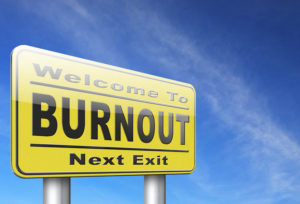By Rose O. Sherman, EdD, RN, NEA-BC, FAAN
Over the past two months, many nurse leaders have told me that they (and most of their staff) are burned out. The story below is typical of what I hear from leaders today.
I am burned out – no, really totally fried, and so are other leaders I work with. We have a wonderful CNO, and we are close as leaders. But two full years of this is way too much. The job is just so different when you constantly struggle with workload and scheduling. I took a couple of PTO days off and felt guilty as I left my unit because I knew we were understaffed. I didn’t enjoy the time off. My staff is furious about the salaries travelers receive. I try to stay positive and not scream – they make more than I do, so I get it. I onboarded a traveler last week and asked her why she had chosen this assignment – it is the money, she said – a better contract than the last one. At least in the past, travel nurses would act interested in the hospital and our team but not now. The staff shows me these videos on Tik Tok that nurses are posting. Some are pretty shocking and certainly not something I would have ever thought about doing. But at another level, I get it. Nurses are frustrated and tired. They don’t see an end to this. Going viral and going public is seen as a way to tell their story. I have learned to listen to staff even when they are being negative – I might not always agree, but I hear them out. There is such irony in all of this. One minute I coach a nurse about burnout, and the next minute I ask them to work another shift. As leaders, we try to support one another, but this is a very tough time.
Burnout is certainly not limited to nurses. Every discipline and department feels the pressure of surging volumes, increased demand for services, and staffing shortages. When you look at the work of the researchers who developed the Maslach Burnout Inventory, they cite six root causes of burnout from decades of research. They are quick to point out that most causes of burnout are traced to organizational cultures and structures and not a lack of staff resilience. Unfortunately, many of these root causes are now part of everyday life in healthcare organizations. They include the following:
- Workload – workload in healthcare has surged over the past two years. Chronic overwork has a severe impact on both our mental and physical health.
- Perceived Lack of Control – when staff feels they have no control over the volume of their work or shift schedule, it can result in extreme burnout. Nurses who leave to travel often talk about a desire to control their work schedules.
- Lack of Rewards and Recognition – when staff feels that they are not respected and not recognized for their work, this can lead to severe burnout. The current challenges with disinformation and patient and family incivility are undoubtedly contributing to nursing staff burnout.
- Poor Relationships – With so much team turnover, nurses feel less connection and friendship with other team members. A lack of connectedness and loss of rituals can lead to a lack of trust.
- Lack of Fairness – when staff feels they are not fairly compensated for their work – this can lead to burnout. Watching travel nurses make 3-6X times what you do as a loyal staff member takes a serious toll on mental health and wellbeing.
- Values Mismatch – when the goals of staff and the organization’s goals are different, it can result in staff burnout. If health systems move to build new hospitals or expand services when they can’t staff the programs they already have – staff can feel a values mismatch.
In her bestselling book, The Burnout Epidemic, Jennifer Moss writes, “the healthcare industry has a long-standing problem with burnout that is encoded in the culture. For a myriad of reasons including excessive workload, stigma, post-traumatic stress, and learned helplessness, we see a major threat that has only gotten worse during the pandemic.”
Fixing nurse burnout begins with the acknowledgment of what is driving it. If we want to build environments of wellbeing in healthcare, we need to look at our organizational structures and policies through this lens. Over the last two decades, there has been a relentless focus on the patient experience. To change healthcare and reduce burnout, we now need to expand that relentless focus to the staff experience.
At this point, we have no choice – nurses are speaking up, speaking out, and quitting.
Read to Lead
A Message on Burnout from Maslach Researchers
Moss J. (2021). The Burnout Epidemic: The Rise of Chronic Stress and How We Can Fix It. Boston: Harvard Business Review
© emergingrnleader.com 2022
Our Most Popular Right Now – Become the Boss No One Wants to Leave Nurse Retention in Turbulent Times
Give your leadership team the gift of a highly rated webinar – Nursing Leadership in 2022: Rebooting after a Life-Quake A Nursing Leadership Reboot Workshop
Read the Nurse Leader Coach – Available at Amazon and Other Book Sellers.
Recommended Book by the Association of Critical Care Nurses – The Nuts and Bolts of Nursing Leadership: Your Toolkit for Success




 LinkedIn
LinkedIn Instagram
Instagram